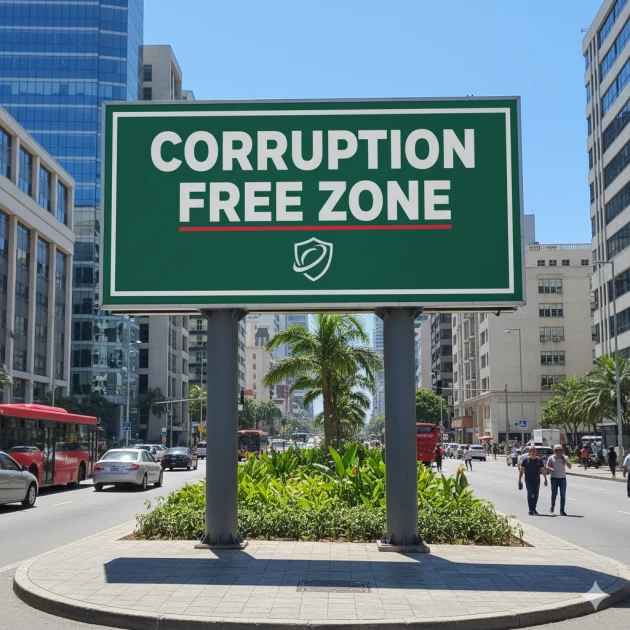OPINION: Kenya’s Turning Point: Unmasking corruption and mobilising reform

This is an artificially generated image

Audio By Vocalize
In some ways, corruption has become institutionalised in our country, with corrupt practices slowly becoming ingrained in our social and economic spheres.
While some argue that it’s ingrained in our culture and question the effectiveness of interventions meant to thwart corruption, others assert that more transparency and accountability are what is needed to entrench anticorruption into our systems and institutions.
However, independent of where you stand in the argument, one thing is certain: corruption is not just a governance issue—it is a national crisis that threatens Kenya’s economic stability, social justice, and global reputation.
Because not only does corruption undermine national security, but it also threatens our future, while creating a gateway for crime that fuels terrorism, organised crime, and economic sabotage.
The question is: what will it take for Kenya to win this war—and why does it need to be non-negotiable?
The numbers tell the story: Kenya loses an estimated Ksh.608 billion annually to corruption, equivalent to 7.8% of GDP.
These losses, which manifest in inflated procurement costs, ghost projects, bribery, and tax evasion, affect core sectors including healthcare, education, identity documentation, and land services, all of which are critical to the well-being of ordinary citizens. So unequivocally, corruption is not just theft; it is a crime against humanity.
Encouragingly, Kenya has begun to respond with urgency. The launch of the Kenya Integrity Plan (2023–2028), enactment of the Conflict of Interest Act, and the proposed Anti-Corruption Laws (Amendment) Bill, 2025 signal a shift from rhetoric to action.
If implemented judiciously and with adequate measures, these reforms could strengthen institutional frameworks, promote ethics, foster public-private collaboration and inadvertently change the nation’s tune on corruption.
For instance, the Kenya Integrity Plan, developed by the EACC and KLIF, has the potential to transform Kenya’s culture from corruption-based to integrity-driven.
If implemented effectively, the plan can bring much-needed transparency in governance by enhancing partnerships, lobbying for stronger legal frameworks, promoting ethics in all sectors, and embedding integrity in society through education.
Separately, the Conflict-of-Interest Act, a landmark law enacted in August 2025, is expected to address a long-standing loophole that has enabled bribery and procurement fraud.
By criminalising self-dealing, mandating asset declarations, and prohibiting public officers from engaging in business with government entities, the Act will likely reduce abuse of power and access, both of which have fuelled graft.
Further, if passed, the Anti-Corruption Laws (Amendment) Bill, unveiled in July 2025, will be a game-changer.
With proposed changes including shorter resolve timelines for corruption cases, limited adjournments, expanded EACC’s investigative powers, and whistleblower protection, the Bill is expected to promote accountability and encourage ethical decision-making.
However, legislation alone is insufficient. Winning this war requires unwavering political will, institutional integrity, and citizen empowerment.
For this to happen, agencies like the EACC, ODPP, and Judiciary must be independent, well-funded, and free from political interference.
Additionally, leadership accountability is paramount. Leaders must set the tone from the top, demonstrating transparency and ethical conduct. One way this can be achieved is through intentional efforts to end patronage politics and a commitment to appointments based on competence and integrity.
Digital transformation is also a critical lever. By digitising public services—especially in land registries, procurement, and licensing- Kenya can reduce opportunities for bribery and enhance transparency.
However, this also requires concerted efforts to ringfence digital tool utilisation, especially amid rising cases of digital financial crime.
The private sector must also play its part. Businesses must implement compliance frameworks, reject corrupt practices, and advocate for fair competition.
With evidence that corruption increases the cost of doing business and deters investment, the private sector should not only champion ethical business practices, but create platforms, policies and knowledge pools to advance anticorruption moves.
Kenya can draw some lessons from Singapore’s journey. Through strong leadership, independent enforcement, competitive salaries, and swift justice, the nation transformed from a corruption-ridden state to a global model of integrity, showcasing that it is indeed possible to change the tide.
Kenya has too much to lose when it comes to corruption. If we want to maintain our economic stature and global positioning, we must build institutions and a culture of integrity, accountability and transparency.
Because it’s only then that Kenya will stand as a beacon of transformation and justice across the region.
The writer is the Eastern Region Head of Compliance at Stanbic Bank


Leave a Comment